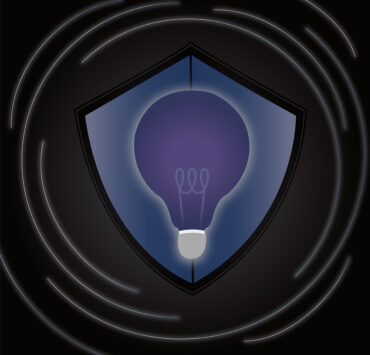|
Getting your Trinity Audio player ready...
|
As a fifth grader, Richard Leach walked into his neighborhood Radio Shack, purchased four books on AC and DC circuits, and read them cover to cover. “I made little circuits; for example, one used a small LM3909 oscillator to blink an LED,” he remembers.
With that blinking LED, his passion for electronics was born and has never ceased. This passion led Leach to earn a degree in microelectronic engineering from Rochester Institute of Technology (RIT). “RIT’s was the only program I believe in the nation that had a semiconductor fabrication facility and a degree focused on every aspect of microelectronics from designing to actually building chips,” he says.
Decades later, Leach went on to earn a law degree from University of Detroit Mercy Law School and is director of intellectual property at Bosch, overseeing IP for Bosch’s Research and Technology Center (RTC) and the Bosch Center for Artificial Intelligence. Bosch manufactures a diverse line of products in mobility solutions, industrial technology, consumer goods, healthcare, and energy and building technology. Although its portfolio is diverse, Leach feels at home, thanks to his microelectronic engineering degree from RIT and his extensive background in semiconductors.
“[Bosch] stretches me in all different directions . . . My job is to serve Bosch’s research groups by speaking their language. There’s no way I can completely understand the technology to the same level they do . . . but I can speak their language,” Leach says. “The environment at Bosch is very positive. The culture cultivates great people and great leaders.”
Leach reports to the vice president of Bosch North America and has one direct report. He spends most of his time managing outside counsel and Bosch’s growing docket of IP cases while drafting numerous patent applications yearly. As a research leader in several fields Bosch enjoys a robust collaborative relationship with many universities, such as the Carnegie-Bosch Institute with Carnegie Melon University in Pittsburgh, a collaboration that yields numerous research findings and papers. “In research, there’s a lot of opensource software, university relations and IP contracts and IP agreements,” he says.
“The environment at Bosch is very positive. The culture cultivates great people and great leaders.”
Richard Leach
Before earning his JD, Leach had stints as an electrical engineer at some of America’s most innovative electronics companies. He even served as a police officer on his way to Bosch. While studying electronics at RIT in 1986, Leach entered a cooperative program at National Semiconductor in which he worked as a product engineer for discrete and linear devices and design engineer for microcontrollers.
“It was very hands on,” Leach reflects. However, sensing that National’s market share was waning, he moved to Motorola in 1992, where he worked on its PowerPC microprocessor. “At the time, the big name was Intel and PowerPC was supposed to be the next major architecture for microprocessors,” he says. While at Motorola Leach earned an MBA.
He moved to Cirrus Logic in 1998 just as music files were shrinking and MP3 players were making music even more portable than Sony’s Discman. MP3 players were using a hardware decoder that limited bitrate and format and reduced audio fidelity. Cirrus Logic used an innovative solution based on the ARM architecture, which interfaced seamlessly with CODECs to create MP3 players which decoded a wider range of audio standards and offered listeners a variety of bitrates. At its height, Cirrus Logic had about 70 percent market share.
Leach’s career in electronics was abruptly halted by the terrorist attacks of September 11, 2001. With few prospects in the electronics field, Leach found a job with the Austin Police Department walking a beat. Then, out of the blue, a college roommate in Detroit enticed him with a job at NEC Electronics, supporting the Detroit auto manufacturers. Reluctantly, he moved to Detroit, applied to the University of Detroit Mercy Law School, and earned his law degree while working full-time at NEC. Leach accepted a job as a technical specialist with Brooks-Kushman Law Firm just before earning his JD and remained there until 2018 when he moved to Bosch.
Leach has always had a passion for technology and electronics and encourages young lawyers to follow their own passions. “You have to have something that’s your passion and that you really enjoy,” he advises. “If you’re just doing it as a job, you can still do it, but the passion is what really drives you to excel and go above and beyond.”
“Your job is to protect and counsel people. Your job is to help people. It’s really all about serving other people.”
Richard Leach
“We have been fortunate to partner with Richard Leach and the Robert Bosch legal team to serve their patent legal needs,” says Matthew Jakubowski, shareholder at Brooks Kushman. “Richard has done an admirable job managing and growing an active docket, and he supports and enables us as outside counsel to succeed with inventors and the client. He also supports his community through his volunteer activities, which speaks to his caring character.”
When Leach is not counseling at Bosch, he volunteers with the Troy Fire Department in the greater Detroit area as a lieutenant and with the Pine KnobSki Patrol—jobs that are not dissimilar than being a lawyer. “Your job is to protect and counsel people. Your job is to help people. It’s really all about serving other people,” Leach says.
”Richard uses his deep knowledge of patent law to provide Bosch with superior legal counseling. We are proud to work with Richard and feel privileged to have been providing legal services to the Bosch group of companies for over twenty years.”
—Paul J. Maginot, Founding Partner


